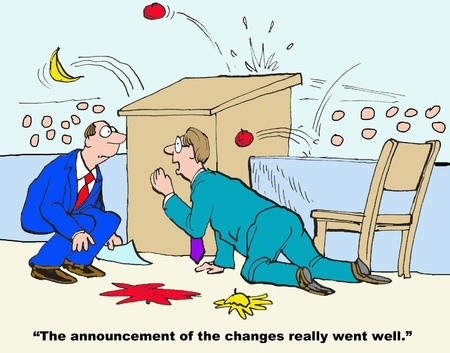If you want to know how people change, read this post.
Change your mind, change your mood, change your life.
What follows combines two of my favorite subjects: the psychology of belief and the need for radical civility in political discourse. Doesn’t sound all that sexy, I admit. But understanding why we hate ambiguity is the key to understanding how people change – or don’t. It’s also key to how we got where we are in the state of political discourse. It comes down to this: sometimes we think a good lie is better than the truth, especially when the truth requires us to see things in a new way.
I become homicidal when people try to reason with me
That’s item 13 in my favorite spoof psychological test, the No-Nonsense Personality Inventory: “I become homicidal when people try to reason with me.” I always thought it was a joke. Apparently not.
My experience with two of my recent blog posts, one about greed in healthcare and the other about the uproar over Kaepernick’s refusal to stand for the national anthem, created this post. Both of those posts garnered a lot of action on my Facebook page. For both, many of the comments were from those from the right side of the political spectrum, including a lot of Trumpets. For both, someone accused me of being an “Obama lover” – oh, my, the horror – and for both someone ridiculed my more provocative statements. The healthcare post got more positive comments overall, and added “likes” to my page. The flag post, not so much.
Several readers took me to task for “trying to please everyone. When I said that I was trying to engage in a conversation, to understand other points of view, things got worse. People got madder. That surprised me.
It surprised me, that is, until I realized that right now, a lot of people aren’t interested in a dialogue. They are interested in being heard. They don’t want to solve a problem – they want the problem recognized, and acknowledged. They want you to hear their interpretation of the world.
It’s a lot like when you’re venting to your mate, and s/he starts problem-solving and being reasonable, and you become enraged. You’ve been there, right, on one side of this or the other?
The only thing that makes people madder than not hearing them, is to try and reason with them.
Sometimes a good lie is better than the truth
So what the hell does this have to do with change?
One of the questions I get a lot is some version of, “how do people change?” It might be personal – “how do I change?” – or something more generic – one friend asked about “rewiring the brain against unconscious bias,” asking, “how DO we unlearn?”
The good news: I believe that people do change.
The bad news is that the first thing you have to learn to do is tolerate ambiguity. To change, you have to be willing to stand on shifting sands. You have to develop sea legs. Mostly, you have to be willing to be anxious.
Because nothing makes us anxious like not knowing, not being certain.
Human brains make meaning. It’s what we do. We take in a ton of information, filter it through the brain’s ascending reticular formation, flavor it with emotion from the limbic system, and process it through the billions of interconnections between neurons. First we screen for danger, then for familiarity, then for whether we have to do something about it. Eventually out the other end comes a meaning: “Oh, THAT’s what that is.”
I call it Steel Trap Mind. We feel something, hear something, see something, think something, and filter it through a blazingly fast network of interconnected neurons until the trap snaps shut on a meaning. It’s what we do.
Steel trap mind
Here’s the tricky part. That space between input and identifying its meaning makes us anxious. We don’t like that moment. In fact, we hate that moment. In fact, we’ll do anything to avoid that moment.
Including prematurely springing the trap out of our anxiety that we’ll never catch anything.
The longer that trap stays open, the more anxious we get. The more anxious we get, the more likely we are to snap it shut on whatever idea comes by. Even if – and this is a really important bit – that idea is dead wrong.
The problem is that even a wrong idea makes us less anxious, so it’s self-reinforcing.
That’s how we end up with ideas like “I’m a failure,” because it’s more comforting than it is to decide that you need to do things differently at work. Or, “I need a divorce,” because it’s easier to decide to divorce than it is to not know how to make things better.
It’s also how we end up with ideas like “black people are thugs” because that’s easier than critically evaluating the data around discrimination, let alone considering that maybe I think that because I’m a privileged white guy. Or, “she must have wanted it,” because that’s easier than thinking that maybe that white kid just might be the product of a rape culture that you help create.
Or even, “everything will be ok if only Hillary gets elected” or “it would have been ok if only Bernie got the nomination.”
See how that works?
How people change
So this is how people change: you first have to be willing to be anxious, and stop landing on the first idea that makes you feel better. You have to celebrate uncertainty, because it’s where you start to learn something new.
Even if it means listening to people you think are stupid.
Dr. Les Kertay




